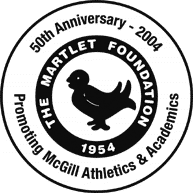Epilogue: The Martlet Foundation
Epilogue: The Martlet Foundation McGill University
User Tools (skip):
Epilogue: The Martlet Foundation
No one had any idea, back in 1954, when a group of alumni incorporated the Martlet Foundation under the Canada Corporations Act, how important its role in support of McGill would become. The original purpose was to help promote athletics, but the corporate objects were, in the pedantic style of the day, expressed in much loftier terms.
The Foundation first established a loan fund to help student athletes pay for tuition and books and, in time, it became the largest free-standing fund at McGill. More than 1,700 students have had access to Martlet loans and the fund continues to this day. In addition to assisting students with their financial obligations, the Martlet Foundation helped McGill's recruiting activities by sponsoring athletic events for high school students on campus to provide exposure to the University. I was one such student and the impact on the occasion of a Martlet swim meet was one of the main reasons I came to McGill.
McGill's continuing struggle with the Quebec government over funding was to provide an unforeseen opportunity for the Martlet Foundation to assist the University. Starting about 1970, the government had forced McGill to draw down on all its unrestricted endowments by withholding funding. Not only that, but it penalized the University for any success it enjoyed in attracting unrestricted donations and legacies, deducting 50% of each unrestricted gift from the annual operating grant.

The financial condition of McGill became so precarious that, by late 1970, a preliminary decision had been taken to close the Macdonald campus and to cancel all intercollegiate sports. The Foundation was authorized to raise funds for athletics, but only from previous non-donors to the University. They raised enough to get some of the teams operational for the 1971-72 season, even if the coaches were all volunteers.
The first organization to seize on the possible use of the Martlet Foundation as a vehicle through which McGill could raise funds beyond the original athletics focus was the Graduates' Society (now the McGill Alumni Association), which operated the Alma Mater Fund, the "living legacy" idea founded by E. P. Taylor, BSc'22, LLD'77. Funds would be channelled through the Foundation, which would give those funds in turn to specific purposes applied for by the University, so that every donation was, in effect, restricted. The Foundation was at arm's length from the University, and Quebec's reach for what would otherwise have been undesignated funds was thwarted. This same idea spread to alumni and friends who were considering bequests, and they were encouraged to think of leaving their bequests to the Foundation.
Eventually the University itself moved in the same direction, although not without some misgivings, precisely because the Foundation was not under its control. The Foundation agreed to some modifications of its membership, to include, for example, the right of the University to appoint some of its governors as trustees of the Foundation, although such appointees were always in a minority position. Over the period 1972-73 to 1984-85, the Foundation processed more than $120 million in gifts destined for the benefit of McGill.
The founders of the Foundation, true to their original objectives, made sure that McGill agreed to continue funding intercollegiate sports. In addition, the University allowed the Foundation to make contributions to the supplementary budget of the Athletics Department. A visible reminder of the history of this activity can still be seen on Alma Mater Fund solicitation cards each year, where donors continue to have the option of designating all or part of their donations to the support of athletics.
In 1974, the late H. Greville Smith left 30% of his estate to the Foundation, to be used as the trustees saw fit, but with a preference for undergraduate scholarships and postgraduate scholarships and research. The trustees had protracted negotiations with the University, which wanted to fold these funds into its general scholarship portfolio. The trustees were not receptive to the idea, because the University refused to recognize factors other than academic performance in making awards. The Foundation wanted to create the premier entrance scholarship program in the country, modeled along the lines of the Rhodes Scholarships and recognizing leadership, community involvement and contributions to student life as well as academic excellence. In one of the few occasions on which the Foundation and the University agreed to disagree, the Foundation insisted on its vision of how the bequest should be applied and created the Greville Smith Scholarship program, whose awards have become the gold standard of university entrance scholarships in Canada, attracting multi-talented young students from all over Canada to McGill who might never have come had the program not been in place.
The Martlet Foundation has helped to support athletics and students for 50 years and stepped in to help the University avoid the confiscatory funding policies of Quebec that attacked the ability of McGill to attract charitable support in the furtherance of its mission. It designed and administered the leading scholarship program in the country to help bring the best and brightest students to the University. It has been a friend in times of need and a friend indeed for McGill.
Richard Pound is Chancellor of McGill University.


